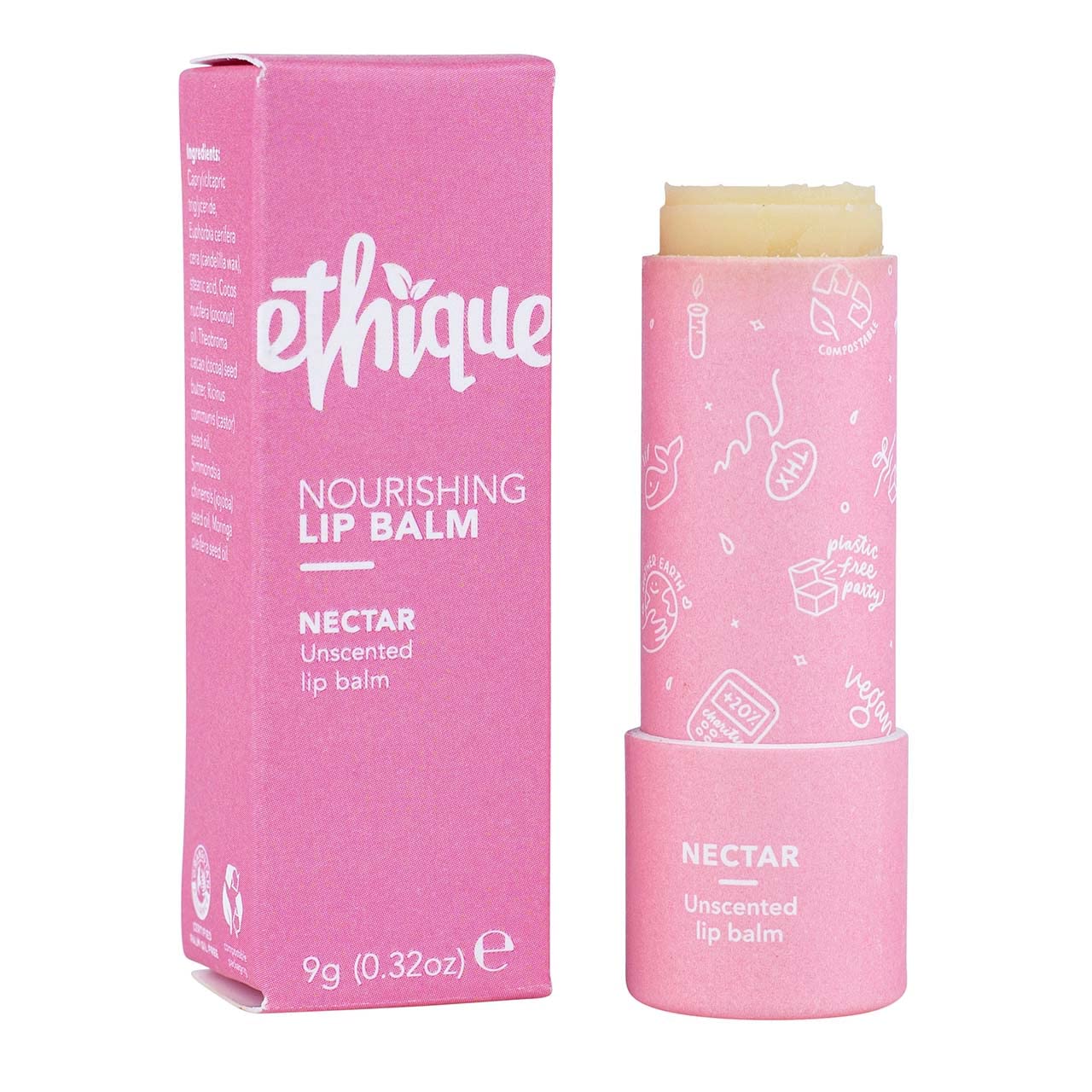
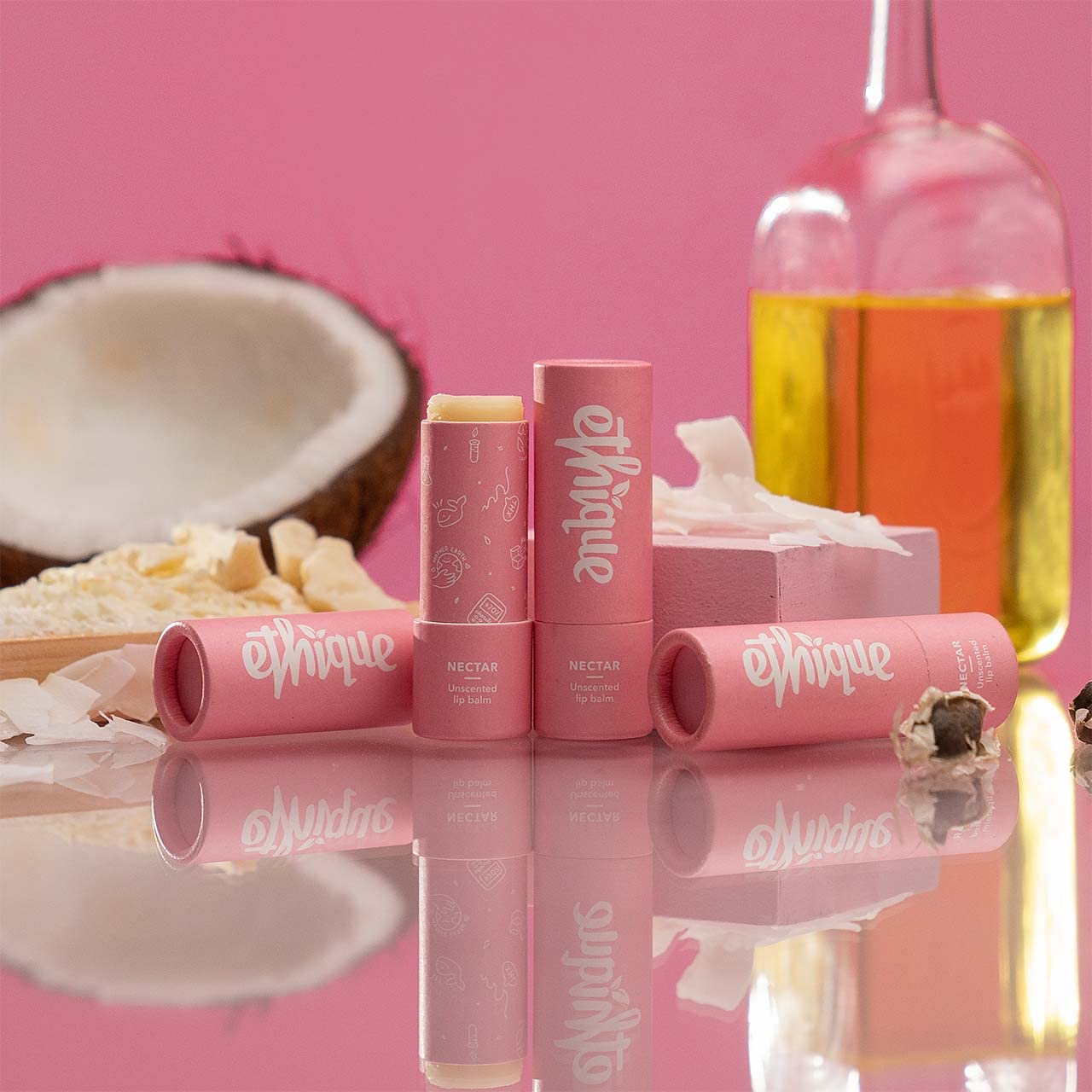
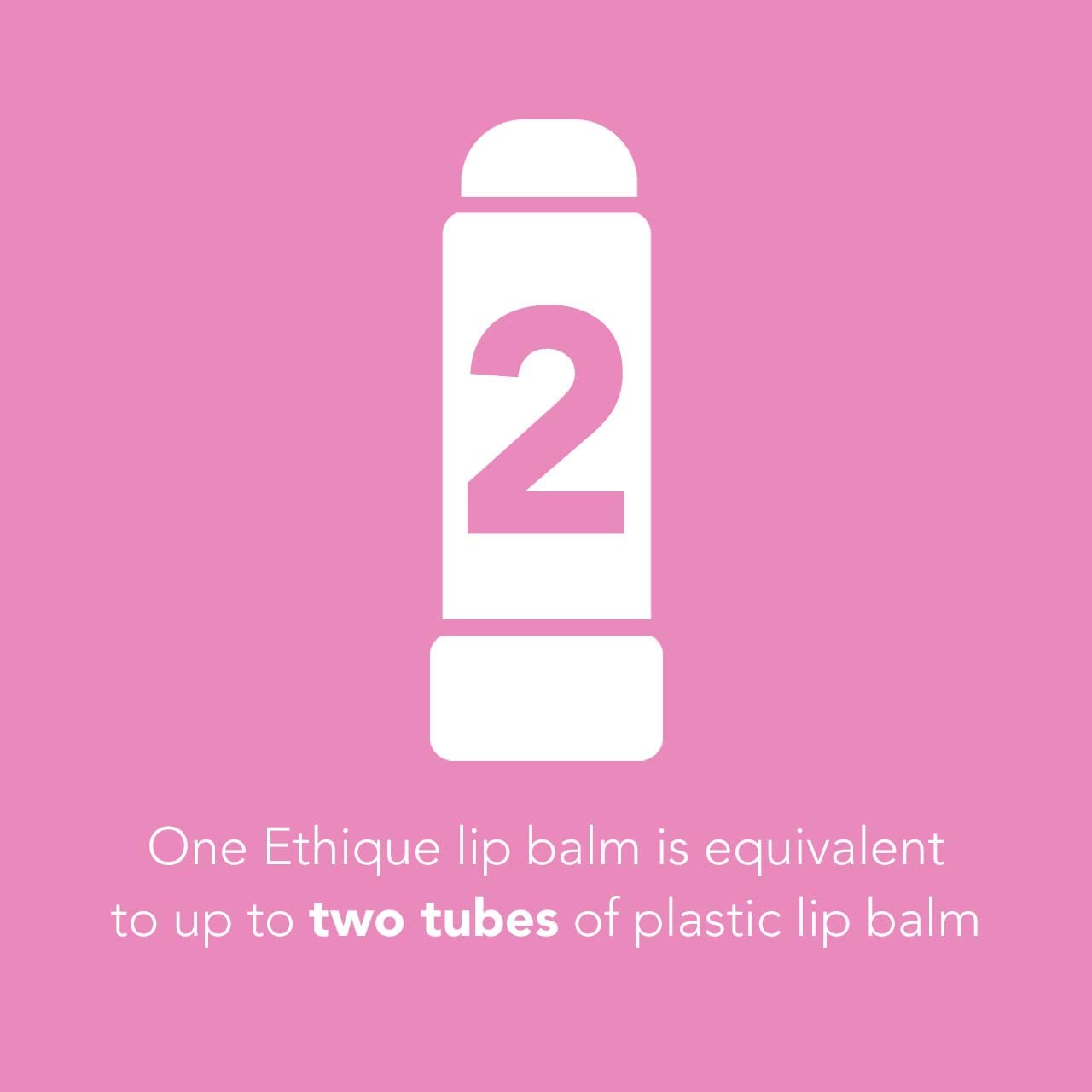
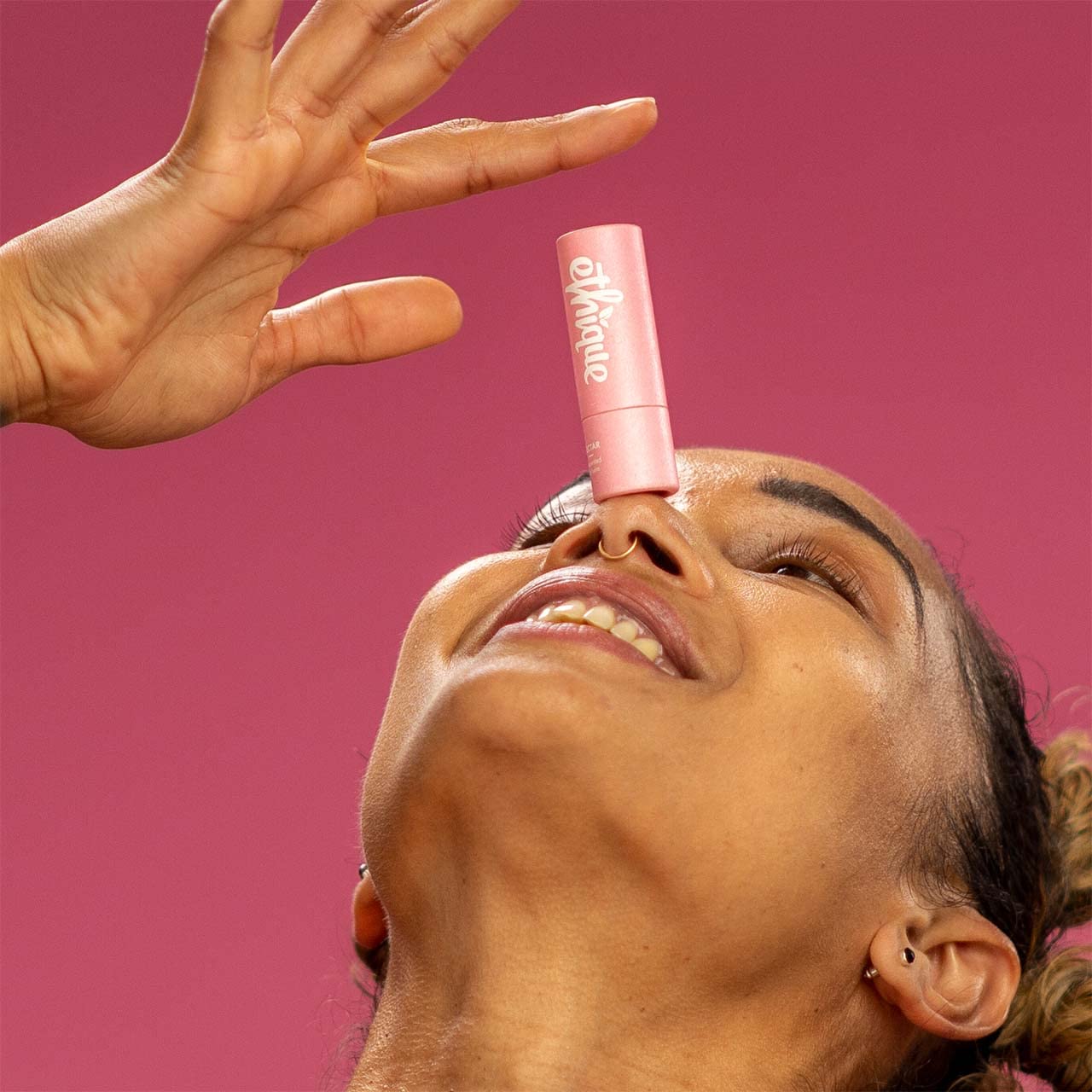
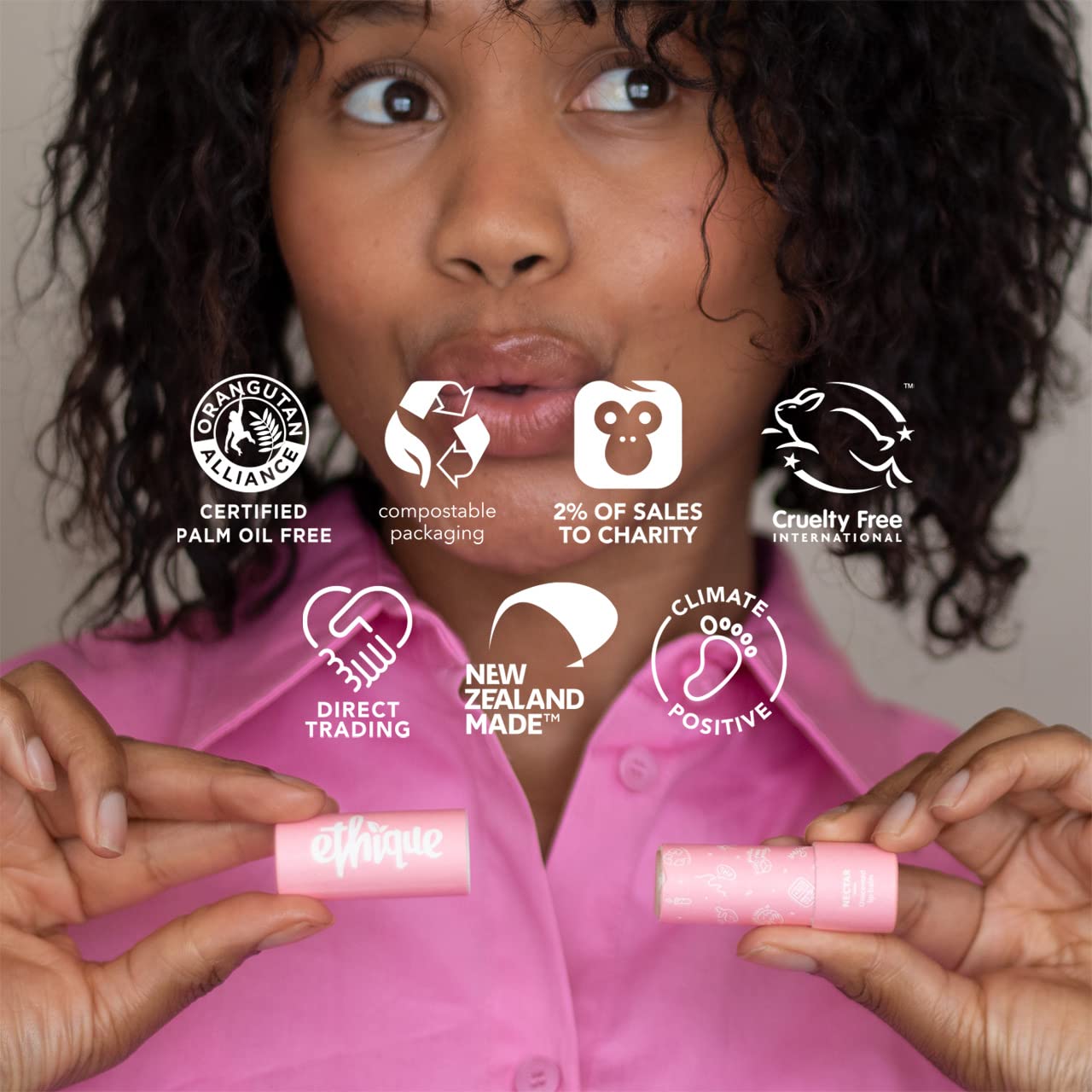
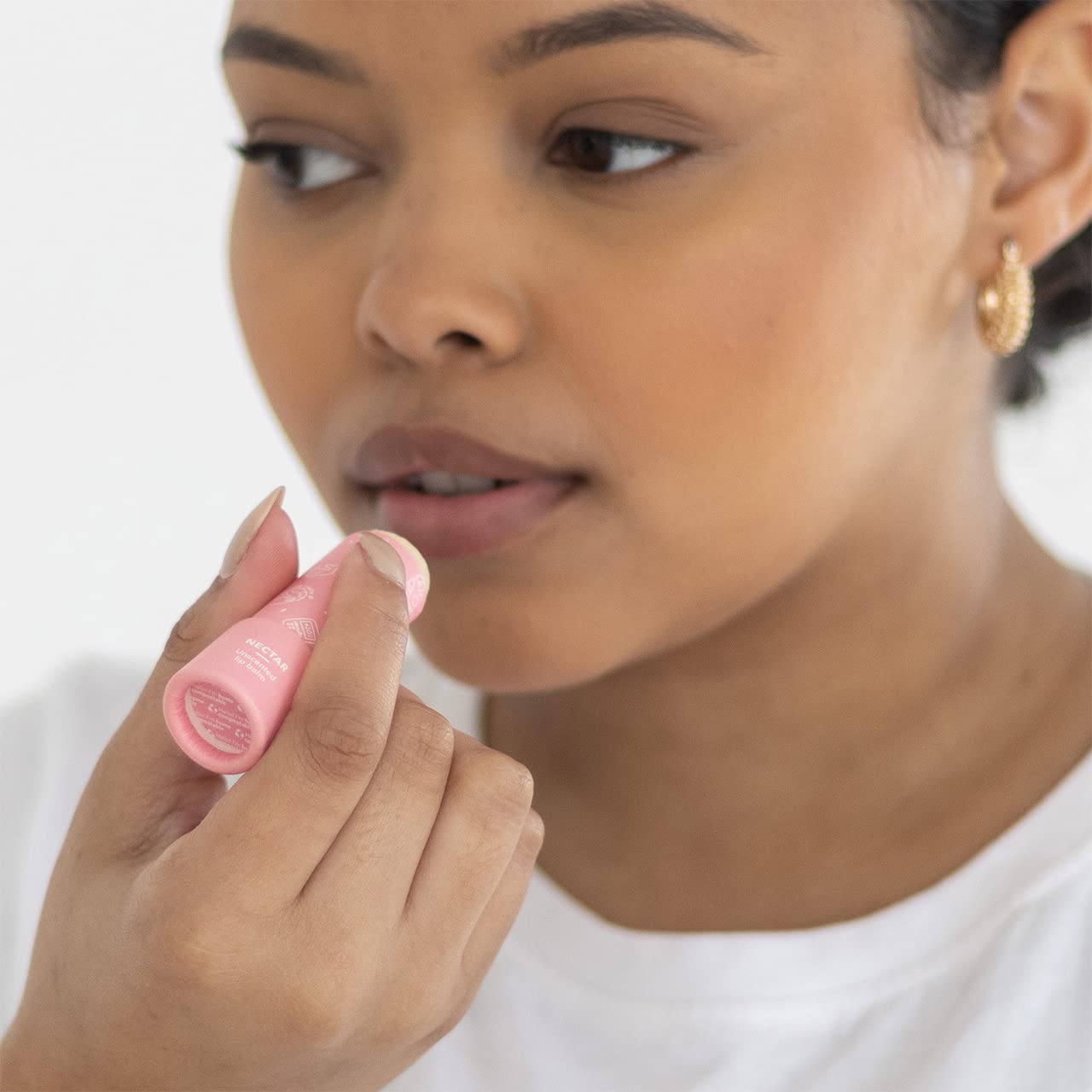
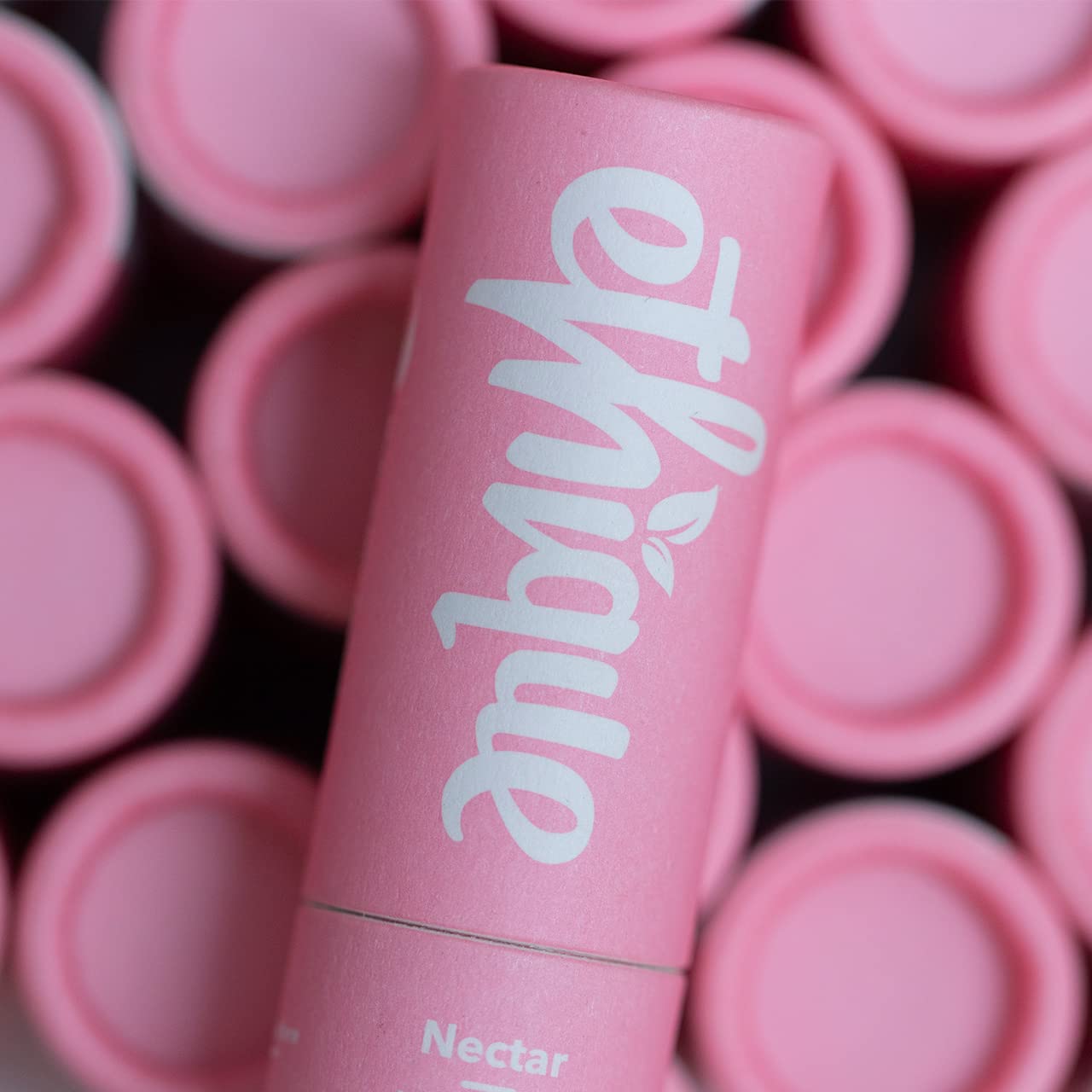
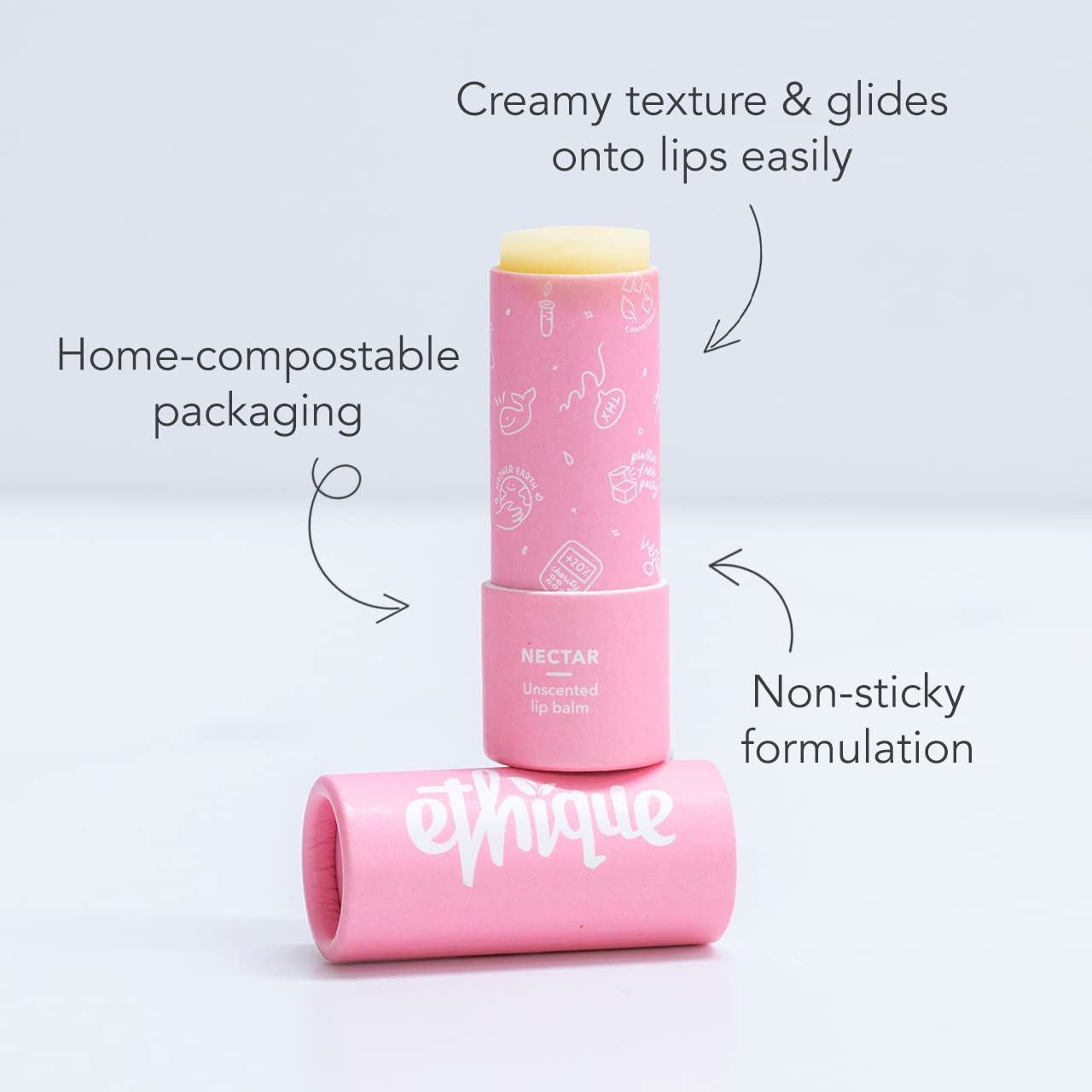
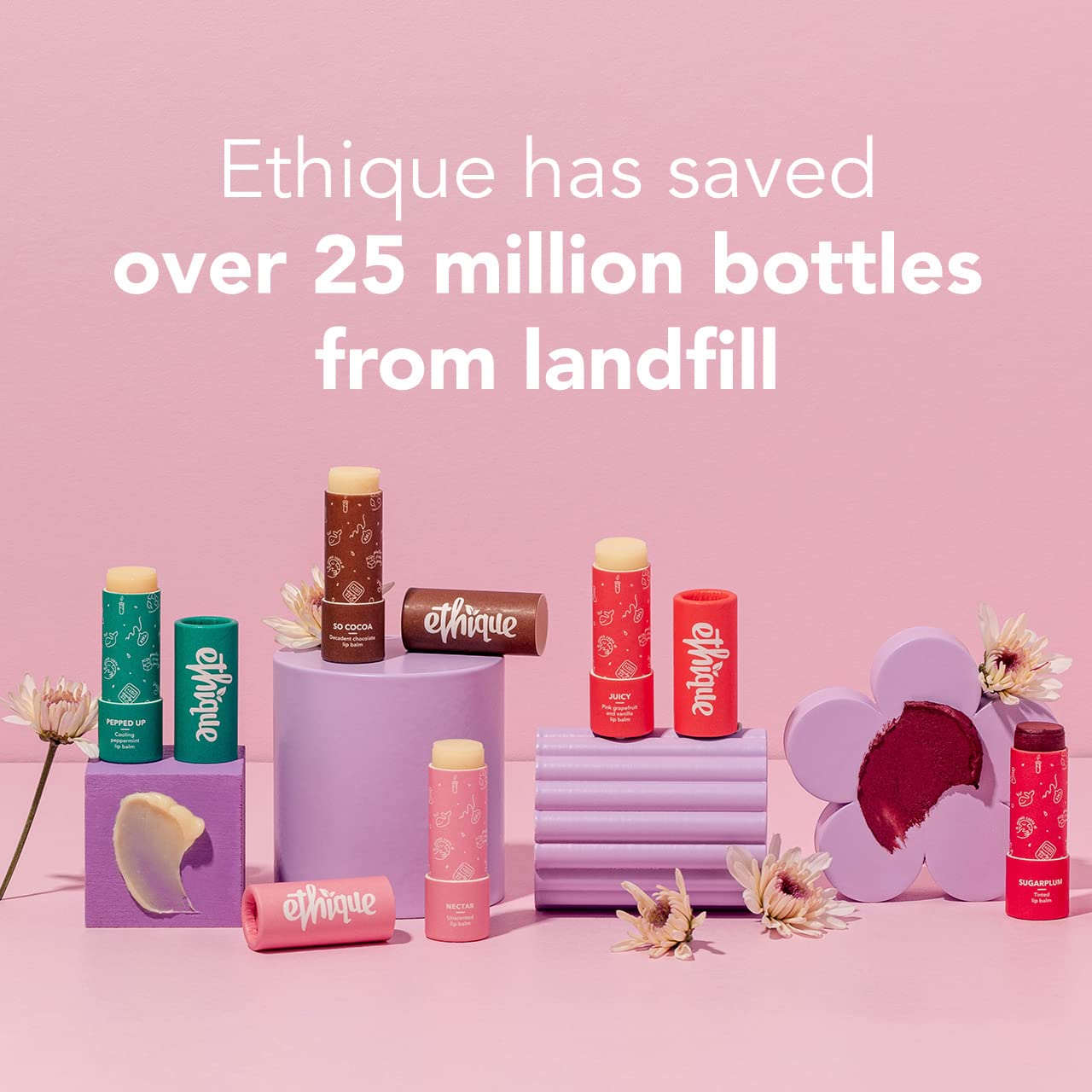
Ethique Nectar Lip Balm - Vegan, Cruelty-Free, Plastic-Free - 0.32 oz


Linalool
High RiskLinalool is a terpene commonly found in various plants, particularly in lavender and mint. It is primarily used in products for its fragrance and potential antimicrobial properties. Linalool is also utilized in formulations for its ability to enhance the sensory experience of personal care and household products.
Sustai Insights
Linalool offers functional benefits as a naturally occurring fragrance component and may exhibit antimicrobial properties. However, it presents high allergenic potential, with concerns about skin irritation and sensitization. Environmental risks include contamination issues, though it is not classified as a persistent pollutant. Regulatory bodies have noted the need for careful handling due to its allergenic nature. Overall, despite some beneficial attributes, the ingredient carries a high risk profile, warranting cautious use and consideration of safer alternatives.
Ricinus Communis (Castor) Seed Oil
Medium RiskCastor oil is extracted from the seeds of Ricinus communis and is commonly used in cosmetic and personal care products for its moisturizing and emollient properties. It is known for its ability to enhance skin absorption and provide a protective barrier.
Sustai Insights
Castor oil offers functional benefits as a moisturizer and emollient, enhancing skin absorption and providing a barrier against moisture loss. It is sustainably sourced and biodegradable. However, potential health risks include low levels of irritation and moderate concerns regarding developmental and reproductive toxicity. Environmental risks are low, with no significant pollutant or bioaccumulation concerns reported. Regulatory status shows no current restrictions. Overall, the risk level is assessed as medium, with recommendations for safe usage practices, and potential alternatives include other plant-based oils.
Limonene
Medium RiskLimonene is a scent ingredient and solvent naturally found in citrus fruits, commonly used in personal care and cleaning products for its fragrant properties. It serves as a flavoring agent and enhances the overall sensory experience of products.
Sustai Insights
Limonene offers functional benefits such as acting as a solvent and fragrance enhancer. However, it carries a high allergenic potential, which can trigger skin or respiratory sensitivities in some individuals. Environmental concerns include moderate persistence and bioaccumulation, along with potential ecotoxicity. Regulatory restrictions necessitate verification in products containing this ingredient. Overall, the risk level is assessed as medium, emphasizing the importance of cautious use, particularly for sensitive populations. Safer alternatives may be considered to mitigate these risks.
Theobroma Cacao (Cocoa) Seed Butter
Low RiskTheobroma cacao (cocoa) seed butter is extracted from the roasted seeds of the cocoa plant. It is commonly used in cosmetics and skincare products for its emollient properties, helping to moisturize and soften the skin. Cocoa butter is also known for its stability and resistance to rancidity.
Sustai Insights
Cocoa butter is recognized for its effective moisturizing properties and is sustainably sourced, contributing to its appeal in personal care products. It poses low health risks, with minimal concerns regarding carcinogenicity, allergies, or reproductive toxicity. Environmentally, it does not significantly contribute to pollution or bioaccumulation. Regulatory bodies impose few restrictions, affirming its safety. Overall, the risk associated with cocoa seed butter is low, making it a favorable ingredient in cosmetics. Alternatives include shea butter or plant oils for similar emollient benefits.
Simmondsia Chinensis (Jojoba)
Low RiskSimmondsia chinensis, commonly known as jojoba, is an oil derived from the seeds of the jojoba plant. It is commonly used in cosmetic formulations for its moisturizing properties, acting as an emollient and skin conditioning agent.
Sustai Insights
Jojoba oil offers functional benefits such as effective skin moisturization and is biodegradable, with sustainable sourcing practices. Health risks are low, with minimal concerns regarding carcinogenicity, allergies, and reproductive toxicity. Environmental impact is negligible, with no pollutant or bioaccumulation potential. Regulatory status is favorable with no significant restrictions noted. Overall, it is assessed as low risk, and safe usage practices should be maintained. Alternatives include other plant-derived oils like argan or almond oil, which may provide similar benefits.
Caprylic Triglyceride
Low RiskCaprylic triglyceride is an ester derived from coconut oil and glycerin, commonly used in cosmetic formulations as an emollient, stabilizer, and skin-conditioning agent. It helps to improve the texture and spreadability of products while providing a lightweight, non-greasy feel.
Sustai Insights
Caprylic triglyceride offers functional benefits such as enhanced skin moisturization and improved formulation stability. It is generally regarded as safe, with low concerns regarding carcinogenicity, allergenic potential, and reproductive toxicity. Environmental impact is minimal, with no significant pollutant or bioaccumulative properties identified. Regulatory bodies have not issued warnings or restrictions. Overall, the risk level is low, making it a suitable ingredient in cosmetic products. Safe usage practices include adhering to recommended concentrations, and while there are alternatives, caprylic triglyceride remains a reliable choice.
Moringa Oleifera Seed Oil
Low RiskMoringa oleifera seed oil is an oil obtained from the seeds of the Moringa tree, known for its moisturizing properties and rich nutrient profile. It is commonly used in cosmetic formulations for its emollient and skin conditioning benefits.
Sustai Insights
Moringa oleifera seed oil offers functional benefits such as moisturizing and enhancing skin absorption, making it effective in cosmetic products. It is considered low risk for health concerns, including carcinogenicity, allergies, and reproductive toxicity. Environmentally, it poses minimal risks, with no significant pollutants or bioaccumulation. Regulatory assessments indicate no restrictions on its use. For safe application, it is recommended to follow standard cosmetic usage practices. Alternatives include oils like jojoba or argan oil, although moringa's sustainability credentials make it a favorable option. Overall, the risk level is assessed as low.
Euphorbia Cerifera (Candelilla) Wax
Low RiskCandelilla wax is extracted from Euphorbia cerifera, a shrub native to northern Mexico and the southwestern United States. It is primarily used as a thickening agent, emollient, and film-forming agent in cosmetic and personal care products.
Sustai Insights
Candelilla wax serves effectively as a natural thickener and emollient, contributing to product texture and moisture retention. It is biodegradable and sourced sustainably, supporting eco-friendly formulations. Health risks are low, with minimal concerns about sensitization. Environmental hazards are also low, with no significant pollutant or bioaccumulation potential noted. Regulatory bodies impose few restrictions, indicating overall low risk. Safe usage practices should be followed, and alternatives like carnauba wax may be considered for those seeking different plant-based options.
Stearic Acid
Low RiskStearic acid is a naturally occurring fatty acid commonly found in animal and vegetable fats. It functions primarily as an emulsifier, thickener, and stabilizer in cosmetic and personal care products, providing texture and consistency.
Sustai Insights
Stearic acid offers functional benefits such as effective emulsification and stabilization of formulations. It is derived from renewable sources and is biodegradable, contributing to its sustainability profile. Health risks are low, with minimal concerns regarding carcinogenicity, allergies, or reproductive toxicity. Environmental risks are also low, with no significant pollutants or bioaccumulation concerns noted. Regulatory bodies, including the FDA, do not impose restrictions on its use. Overall, stearic acid is assessed as low risk, and its safe usage practices are well-established, with no significant alternatives needed.
Ricinus Communis (Castor) Seed Oil
Medium RiskCastor oil is extracted from the seeds of Ricinus communis and is commonly used in cosmetic and personal care products for its moisturizing and emollient properties. It is known for its ability to enhance skin absorption and provide a protective barrier.
Sustai Insights
Castor oil offers functional benefits as a moisturizer and emollient, enhancing skin absorption and providing a barrier against moisture loss. It is sustainably sourced and biodegradable. However, potential health risks include low levels of irritation and moderate concerns regarding developmental and reproductive toxicity. Environmental risks are low, with no significant pollutant or bioaccumulation concerns reported. Regulatory status shows no current restrictions. Overall, the risk level is assessed as medium, with recommendations for safe usage practices, and potential alternatives include other plant-based oils.
Theobroma Cacao (Cocoa) Seed Butter
Low RiskTheobroma cacao (cocoa) seed butter is extracted from the roasted seeds of the cocoa plant. It is commonly used in cosmetics and skincare products for its emollient properties, helping to moisturize and soften the skin. Cocoa butter is also known for its stability and resistance to rancidity.
Sustai Insights
Cocoa butter is recognized for its effective moisturizing properties and is sustainably sourced, contributing to its appeal in personal care products. It poses low health risks, with minimal concerns regarding carcinogenicity, allergies, or reproductive toxicity. Environmentally, it does not significantly contribute to pollution or bioaccumulation. Regulatory bodies impose few restrictions, affirming its safety. Overall, the risk associated with cocoa seed butter is low, making it a favorable ingredient in cosmetics. Alternatives include shea butter or plant oils for similar emollient benefits.
Simmondsia Chinensis (Jojoba)
Low RiskSimmondsia chinensis, commonly known as jojoba, is an oil derived from the seeds of the jojoba plant. It is commonly used in cosmetic formulations for its moisturizing properties, acting as an emollient and skin conditioning agent.
Sustai Insights
Jojoba oil offers functional benefits such as effective skin moisturization and is biodegradable, with sustainable sourcing practices. Health risks are low, with minimal concerns regarding carcinogenicity, allergies, and reproductive toxicity. Environmental impact is negligible, with no pollutant or bioaccumulation potential. Regulatory status is favorable with no significant restrictions noted. Overall, it is assessed as low risk, and safe usage practices should be maintained. Alternatives include other plant-derived oils like argan or almond oil, which may provide similar benefits.
Caprylic Triglyceride
Low RiskCaprylic triglyceride is an ester derived from coconut oil and glycerin, commonly used in cosmetic formulations as an emollient, stabilizer, and skin-conditioning agent. It helps to improve the texture and spreadability of products while providing a lightweight, non-greasy feel.
Sustai Insights
Caprylic triglyceride offers functional benefits such as enhanced skin moisturization and improved formulation stability. It is generally regarded as safe, with low concerns regarding carcinogenicity, allergenic potential, and reproductive toxicity. Environmental impact is minimal, with no significant pollutant or bioaccumulative properties identified. Regulatory bodies have not issued warnings or restrictions. Overall, the risk level is low, making it a suitable ingredient in cosmetic products. Safe usage practices include adhering to recommended concentrations, and while there are alternatives, caprylic triglyceride remains a reliable choice.
Limonene
Medium RiskLimonene is a scent ingredient and solvent naturally found in citrus fruits, commonly used in personal care and cleaning products for its fragrant properties. It serves as a flavoring agent and enhances the overall sensory experience of products.
Sustai Insights
Limonene offers functional benefits such as acting as a solvent and fragrance enhancer. However, it carries a high allergenic potential, which can trigger skin or respiratory sensitivities in some individuals. Environmental concerns include moderate persistence and bioaccumulation, along with potential ecotoxicity. Regulatory restrictions necessitate verification in products containing this ingredient. Overall, the risk level is assessed as medium, emphasizing the importance of cautious use, particularly for sensitive populations. Safer alternatives may be considered to mitigate these risks.
Moringa Oleifera Seed Oil
Low RiskMoringa oleifera seed oil is an oil obtained from the seeds of the Moringa tree, known for its moisturizing properties and rich nutrient profile. It is commonly used in cosmetic formulations for its emollient and skin conditioning benefits.
Sustai Insights
Moringa oleifera seed oil offers functional benefits such as moisturizing and enhancing skin absorption, making it effective in cosmetic products. It is considered low risk for health concerns, including carcinogenicity, allergies, and reproductive toxicity. Environmentally, it poses minimal risks, with no significant pollutants or bioaccumulation. Regulatory assessments indicate no restrictions on its use. For safe application, it is recommended to follow standard cosmetic usage practices. Alternatives include oils like jojoba or argan oil, although moringa's sustainability credentials make it a favorable option. Overall, the risk level is assessed as low.
Linalool
High RiskLinalool is a terpene commonly found in various plants, particularly in lavender and mint. It is primarily used in products for its fragrance and potential antimicrobial properties. Linalool is also utilized in formulations for its ability to enhance the sensory experience of personal care and household products.
Sustai Insights
Linalool offers functional benefits as a naturally occurring fragrance component and may exhibit antimicrobial properties. However, it presents high allergenic potential, with concerns about skin irritation and sensitization. Environmental risks include contamination issues, though it is not classified as a persistent pollutant. Regulatory bodies have noted the need for careful handling due to its allergenic nature. Overall, despite some beneficial attributes, the ingredient carries a high risk profile, warranting cautious use and consideration of safer alternatives.
Euphorbia Cerifera (Candelilla) Wax
Low RiskCandelilla wax is extracted from Euphorbia cerifera, a shrub native to northern Mexico and the southwestern United States. It is primarily used as a thickening agent, emollient, and film-forming agent in cosmetic and personal care products.
Sustai Insights
Candelilla wax serves effectively as a natural thickener and emollient, contributing to product texture and moisture retention. It is biodegradable and sourced sustainably, supporting eco-friendly formulations. Health risks are low, with minimal concerns about sensitization. Environmental hazards are also low, with no significant pollutant or bioaccumulation potential noted. Regulatory bodies impose few restrictions, indicating overall low risk. Safe usage practices should be followed, and alternatives like carnauba wax may be considered for those seeking different plant-based options.
Stearic Acid
Low RiskStearic acid is a naturally occurring fatty acid commonly found in animal and vegetable fats. It functions primarily as an emulsifier, thickener, and stabilizer in cosmetic and personal care products, providing texture and consistency.
Sustai Insights
Stearic acid offers functional benefits such as effective emulsification and stabilization of formulations. It is derived from renewable sources and is biodegradable, contributing to its sustainability profile. Health risks are low, with minimal concerns regarding carcinogenicity, allergies, or reproductive toxicity. Environmental risks are also low, with no significant pollutants or bioaccumulation concerns noted. Regulatory bodies, including the FDA, do not impose restrictions on its use. Overall, stearic acid is assessed as low risk, and its safe usage practices are well-established, with no significant alternatives needed.
Discover the Ethique Nectar Unscented Lip Balm, a perfect choice for those seeking a clean, eco-friendly lip treatment. This 0.32 oz balm is crafted from natural ingredients, ensuring hydration without compromising ethical standards.
- Cruelty-Free & Vegan: Enjoy peace of mind knowing this lip balm is made without animal testing and contains no animal products.
- Plastic-Free: Ethique is committed to sustainability, offering a product free from plastic ingredients, reducing environmental impact.
- Eco-Friendly Ingredients: Composed of nourishing elements like cocoa seed butter and jojoba oil, it hydrates while being gentle on the planet.
- Hydration On-The-Go: Whether you're at home or out and about, this balm provides lasting moisture, perfect for reapplication throughout the day.
- Nighttime Repair: Apply a generous layer before bed for overnight hydration and revitalization, ensuring soft, supple lips by morning.
Ethique Nectar Lip Balm isn’t just a beauty product; it’s a step towards a more sustainable lifestyle.
Subscribe & Save with Sustai
- Best Price Guarantee: Always enjoy the lowest prices on sustainable home essentials.
- No Surprises: We’ll notify you before shipping. No hidden fees, ever.
- You’re in Charge: Change, pause, or cancel your subscription anytime with ease.
- Eco-Friendly Deliveries: Our grouped shipments mean less packaging and lower emissions.
Join us on a sustainable journey. Special offers for a limited time! Prices and promotions may change.
Recommended Products
Discover the Ethique Nectar Unscented Lip Balm, a perfect choice for those seeking a clean, eco-friendly lip treatment. This 0.32 oz balm is crafted from natural ingredients, ensuring hydration without compromising ethical standards.
- Cruelty-Free & Vegan: Enjoy peace of mind knowing this lip balm is made without animal testing and contains no animal products.
- Plastic-Free: Ethique is committed to sustainability, offering a product free from plastic ingredients, reducing environmental impact.
- Eco-Friendly Ingredients: Composed of nourishing elements like cocoa seed butter and jojoba oil, it hydrates while being gentle on the planet.
- Hydration On-The-Go: Whether you're at home or out and about, this balm provides lasting moisture, perfect for reapplication throughout the day.
- Nighttime Repair: Apply a generous layer before bed for overnight hydration and revitalization, ensuring soft, supple lips by morning.
Ethique Nectar Lip Balm isn’t just a beauty product; it’s a step towards a more sustainable lifestyle.

You can have at most 2 Sustainable Steals products in your cart
Customer Reviews
Customers’ View
Customers appreciate the nourishing and moisturizing qualities of the Ethique Nectar Unscented Lip Balm, with many noting that it effectively improves lip condition without irritation. Users have expressed satisfaction with the product's eco-friendly attributes, such as its plastic-free packaging and vegan formulation. One customer highlighted, 'This is the first and only lip balm where my lips actually consistently improved!' Additionally, the balm's pleasant texture has been positively received, as it is described as non-sticky and easy to apply. However, some users mentioned practical concerns regarding the balm's softness, which can lead to melting if not stored properly. Overall, the product aligns well with the values of health-conscious and environmentally aware consumers, providing a reliable option for lip care.
AI-generated from the text of customer reviewsThis product is rated 3.7 of 5.0 stars.
It has received 7 reviews.




